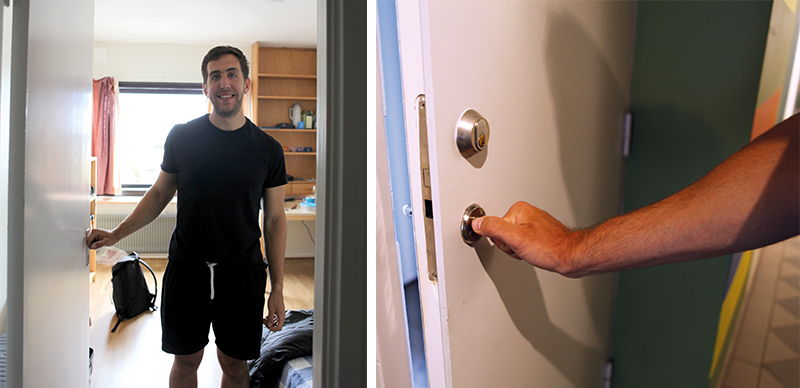The housing shortage in Lund has become an annual challenge to student life in recent years. With high demand and far too little accommodation, looking for rooms adds unnecessary stress to the already difficult experience of moving and starting a new degree.
“In general, they [the university] tried to help us a lot — sending reminders to apply early, links to different housing websites, and even inviting us to a landlord mingle. But what they really need is more corridor rooms,” says Charlotte Josam, a masters student from Germany.
We spoke with her over the phone five days before her arrival in Lund. It was just one day after she had finally been awarded a room through the AF Bostäder Lottery, a queue-based lottery for first time students to receive housing through the student housing company. The tone of her voice was one of real relief; she no longer faced the uncertainty of arriving to a completely new country with no place to live.
Most student accommodations in Lund are managed primarily by two major housing providers: Lund University Accommodation (LUACC) and AF Bostäder, and the applications for student accommodation in Lund largely outweigh the number of rooms available. LUACC, the university department responsible for offering housing for international students, received 3,094 applications this year for the 1,121 rooms they offer, according to the department head Nikolas Theofanous.
Bopoolen is an organization run by the student unions that allows students and landlords alike to advertise their housing needs and offers in an effort to connect them directly. Their website can be a useful alternative if a student is having trouble finding accommodation through the major property managers, though they still face the challenge of not having enough landlords advertising for those who are looking. Project leader Katja Bröms noted that as of the day of our interview, they still had three times the number of students looking for accommodation then there were landlords offering rooms on their website. Bröms also remarked that “it’s hard to know how many of those [ads] lead a student to an actual rent out. And a lot of landlords just go in and look at people seeking housing and find a tenant that way.”
Despite such challenges, the organization plans a number of initiatives, including over 100 pre-arranged couchsurfing opportunities for students who land here on Arrival Day and still have not found a place to stay.
Programs like this could be of good use to many new students such as Martin Balihar, an Erasmus exchange student from the Czech Republic, who told Lundagård that he was preparing to sleep in the woods until he finally received a housing offer just three weeks before his arrival. “I started looking three months ago; it took two months before I got my first response, and I was

even writing to everyone in Swedish. Then three weeks ago, I finally got an offer in Bjärred. She was only the third person to respond to me out of the almost fifty I wrote to,” he recounted, the frustration still sounding in his voice.
The town of Bjärred is approximately a 40-minute bike ride or 36-minute bus trip from the university, and despite his room’s higher than average price, he is happy to know where he’ll be sleeping. “If it were somewhere else – no sea, or if I weren’t looking forward to cycling, I would be disappointed.”
But the question is how big should that shortage be? Because if there is no shortage then we would have empty apartments in the springtime.
LUACC offers a one-time housing guarantee to students coming outside of the EU/EEA, so students like Charlotte Josam and Martin Balihar were thus not eligible, underscoring their difficult search. “It was quite difficult, the whole flat search. I was looking in other cities around Lund, too. At the beginning, there were 700 open rooms in the AF Bostäder queue, and this week there were only 11 rooms left. But then I got an offer yesterday,” Charlotte Josam told Lundagård.
Ariel Frenkel is an exchange student from Argentina who was eligible for the housing guarantee but had missed LUACC’s deadline. He noted that in addition to the security of knowing he had a place to live, he would have also liked to have included that information on his residence permit application. But after missing the deadline, Ariel Frenkel entered the AF Bostäder lottery and was awarded a room at Vildanden after only twenty days: “It could have been better, but it was actually a good price. And considering it’s such a hard experience, I don’t think I had it so bad only waiting for twenty days,” he said.
“If we now have to force them to pay the tuition fee, we can at least guarantee them [the accommodation],” says Nikolas Theofanous. He followed that statement by explaining how guaranteeing housing to tuition-paying students also increases the chances that they will come and pay it, since they know they will have a place to live: “It’s part of the university economy. Because if one course that has 30 students, five of them are tuition fee students, that department doesn’t get economical coverage for the students unless they pay the tuition fee. So they have to make sure those five actually come.”
On the other end of the accommodation search, property owners have a surplus of available tenants. And that’s actually better for property owners, explained AF Bostäder CEO Henrik Krantz: “It’s always like that in September that there is a shortage. But the question is how big should that shortage be? Because if there is no shortage then we would have empty apartments in the springtime. And that would cost us lots of money, and that would increase the rent. And we don’t want that to happen.”
While the housing shortage continues, Krantz and Theofanous alike were hopeful that new rooms will be available in the coming years. By this time next year, AF Bostäder will have 6,100 available rooms, up from the approximately 5,500 they have currently. And by Krantz’ estimates, they will build around 2,000 rooms more in years to come. LUACC has also added two more buildings this term: Sofiaberg, and an additional building at Eddan. They also have plans to expand, despite the slow processes Theofanous describes: “Some things just take a lot of time. The procurement process is long, and then you have to have the political process to get it approved, so we can’t move as quickly as we would like to.” Despite the prospect of more rooms in the future, to students needing places to live now, the situation can feel less hopeful.









